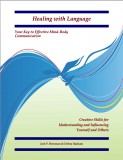One of the best indicators of what you can expect from patients or clients (and others) is their use of modal operators. Modal operators modify verbs and indicate a person’s way of thinking. Modal operators of necessity (such as can’t, won’t, must, have to, need to, should, shouldn’t, if … then) indicate limited choices. Modal operators of possibility (such as can, will, may, might, choose) indicate options.
When a patient or client uses a modal operator of necessity, reframe the statement using a modal operator of possibility:
Patient: I can’t see how this treatment is going to help me.
Reframe: If you could see it, what might it look like?
When reframing might seem argumentative, ask about the person’s model of the world.
Patient: This treatment won’t work.
Question: How do you know?
Listen for the underlying fear, and present options and outcomes in terms of possibility.
Send your questions about how other-than-conscious communication skills can hurt or help your patients and clients to Joel P. Bowman (Joel@SCS-Matters.com) or Debra Basham (Debra@SCS-Matters.com), co-developers of Subtle Communication Systems. We will provide answers to those for you. For more information about Neurolinguistic Programming (NLP), Hypnosis or Hypnotherapy, or about the Imagine Healing Process, visit:http://ImagineHealing.info or http://SurgicalSupport.info.

Healing with Language: Your Key to Effective Mind-Body Communication is available for a limited time for $10 plus $5 shipping within the U.S. For volume orders and overseas shipping, check with Debra.
See the Table of Contents and List of Exercises in PDF format for more information about this comprehensive text and training manual.
